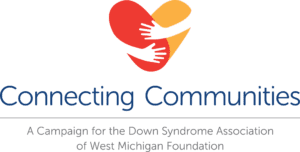 Earlier this month, the leadership of the Down Syndrome Association of West Michigan Foundation (DSAWMF) announced the Connecting Communities campaign, an $850,000 fundraising effort to move their headquarters to the new Special Olympics facility in Byron Center, expand staff and programming services, and build sustainability through an enhanced endowment fund.
Earlier this month, the leadership of the Down Syndrome Association of West Michigan Foundation (DSAWMF) announced the Connecting Communities campaign, an $850,000 fundraising effort to move their headquarters to the new Special Olympics facility in Byron Center, expand staff and programming services, and build sustainability through an enhanced endowment fund.
DSAWMF was established in 2012 to ensure the financial sustainability of its sister organization, the Down Syndrome Association of West Michigan (DSAWM). Founded in 1985 by six couples who had children with Down syndrome, the DSAWM’s original aim was to provide support and share knowledge with other families. Through the years, the goals of the organization have broadened to include regular programming for children, teens, and adults with Down syndrome. DSAWM also serves as an advocacy group, raises public awareness about Down syndrome, and provides for the distribution of information relevant to Down syndrome.
The DSAWM serves hundreds of local families by providing enriching recreational, social, and skill-building activities for area residents with special needs and their families each year. These activities help build a network of support for these families and their children, leading to life-long friendships and a connected community that provides support for families raising children with disabilities.
Launched last year, the Connecting Communities campaign has raised more than $800,000 over the last several months, 95% of the overall campaign goal. Over 75 community donors, local businesses, and area foundations have supported the campaign to date.
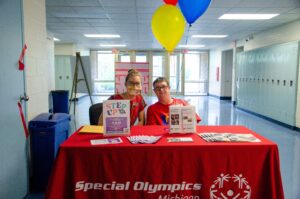 DSAWMF and DSAWM leaders have already relocated their offices to the Special Olympics campus at 160 68th Street SW. The facility, formerly South Christian High School, has been transformed into the largest Special Olympics training and inclusion center in the world. The new facility provides significantly more space for Special Olympics and DSAWM program staff, volunteers, and area youth and adults.
DSAWMF and DSAWM leaders have already relocated their offices to the Special Olympics campus at 160 68th Street SW. The facility, formerly South Christian High School, has been transformed into the largest Special Olympics training and inclusion center in the world. The new facility provides significantly more space for Special Olympics and DSAWM program staff, volunteers, and area youth and adults.
During the public announcement of the fund drive on August 19th, President of Hobart Sales and Service, Jim Leach, and Product and Operations Manager at Rapidparts Inc., Rich Kloeckner, invited the public to join in the fundraising effort which will continue through the end of the year.
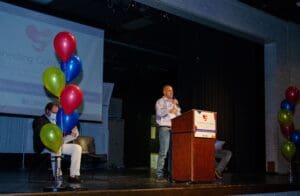 “The invitation to join the Special Olympics at this new campus was a once-in-a-lifetime opportunity,” said Leach. “As we work to provide the very best in programming for children and adults with Down syndrome, I am pleased to be part of an effort that truly gives area families a strong support network, provides children with a place where they feel like they belong, and builds partnerships with like-minded organizations,” he said. “Demand for our programs is increasing,” said Kloeckner. “Currently, we are providing support to nearly 350 people with Down syndrome in the counties we serve, and we anticipate serving many more families over the next several years as West Michigan grows.”
“The invitation to join the Special Olympics at this new campus was a once-in-a-lifetime opportunity,” said Leach. “As we work to provide the very best in programming for children and adults with Down syndrome, I am pleased to be part of an effort that truly gives area families a strong support network, provides children with a place where they feel like they belong, and builds partnerships with like-minded organizations,” he said. “Demand for our programs is increasing,” said Kloeckner. “Currently, we are providing support to nearly 350 people with Down syndrome in the counties we serve, and we anticipate serving many more families over the next several years as West Michigan grows.”
Bob Boylen, Board Chair of the DSAWMF, announced that the campaign has received support from local and regional foundations, area businesses, and generous community donors. “We have been so fortunate to receive gifts to this important campaign. Our Campaign Cabinet joins me in thanking the community for their meaningful gifts. We now invite the broader community to help us complete this campaign effort. We welcome gifts of all sizes,” said Boylen.
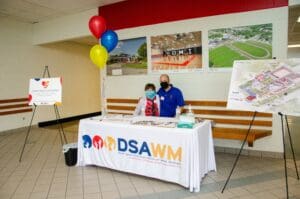 “This is an exceptional opportunity for our community to help build a strong network of support for children and adults that sometimes struggle to find activities and opportunities that meet their abilities,” said Leach. “If we can provide the venue, we know we can reach more families.”
“This is an exceptional opportunity for our community to help build a strong network of support for children and adults that sometimes struggle to find activities and opportunities that meet their abilities,” said Leach. “If we can provide the venue, we know we can reach more families.”
For more information and to support the Connecting Communities campaign, visit dsawmfoundation.org/connecting-communities.
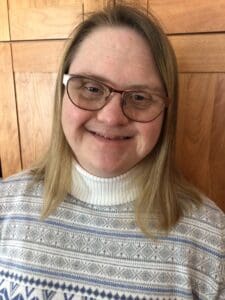 In just a few short days, my life was changed by COVID-19. Many of my routine activities were stopped and shut down. It felt like my life went upside down.
In just a few short days, my life was changed by COVID-19. Many of my routine activities were stopped and shut down. It felt like my life went upside down.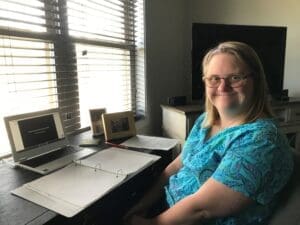 We all tried to make the best of the shutdown. I did lots of crafts. I made a blanket, colored pictures to give to friends and family, did my stamping, melted beads, and painted. We played lots of games like dominoes, Sequence, and Kings in the Corner. I read books and watched movies. We went for lots of walks at the beach and on trails at the parks. It was good to get fresh air! Of course, I did a lot of writing too! I learned how to make a homemade frosty and lots of delicious desserts. I learned how to make chocolate chip cookies! I even made dinner for my parents. People found ways to keep occupied in our own homes. We all had to make good choices.
We all tried to make the best of the shutdown. I did lots of crafts. I made a blanket, colored pictures to give to friends and family, did my stamping, melted beads, and painted. We played lots of games like dominoes, Sequence, and Kings in the Corner. I read books and watched movies. We went for lots of walks at the beach and on trails at the parks. It was good to get fresh air! Of course, I did a lot of writing too! I learned how to make a homemade frosty and lots of delicious desserts. I learned how to make chocolate chip cookies! I even made dinner for my parents. People found ways to keep occupied in our own homes. We all had to make good choices.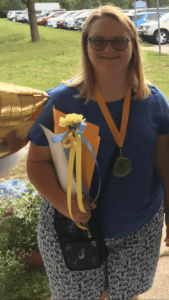 When I was able to get my vaccine, I was nervous, but I tried to stay calm. I am glad that my vaccines are done. The pandemic has changed some things. It has been hard, but look at the good things! We can see our friends again. We can go on vacations. Special Olympics is starting again. My church is back in-person on Sunday mornings. It’s easier to ride Harbor Transit to work and back to my apartment. I’m looking forward to going back to college at Noorthoek Academy in-person.
When I was able to get my vaccine, I was nervous, but I tried to stay calm. I am glad that my vaccines are done. The pandemic has changed some things. It has been hard, but look at the good things! We can see our friends again. We can go on vacations. Special Olympics is starting again. My church is back in-person on Sunday mornings. It’s easier to ride Harbor Transit to work and back to my apartment. I’m looking forward to going back to college at Noorthoek Academy in-person.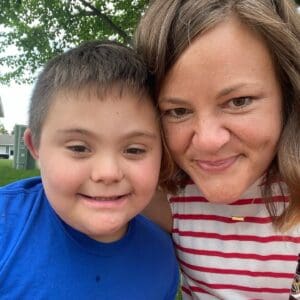
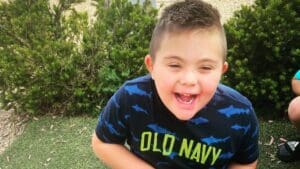 His screening took place at our local Children’s hospital. It took about 4 hours and part of us wondered if we would go and they would dismiss his behavior as “low functioning” Down syndrome. We had heard from other families who had gone through testing 5-10 years before that it wasn’t an uncommon phrase when they inquired about a dual diagnosis. At the end of the appointment, we heard the words, he has autism. They would of course have to write up the report and file all the paperwork, but we had our disability punch card punched again.
His screening took place at our local Children’s hospital. It took about 4 hours and part of us wondered if we would go and they would dismiss his behavior as “low functioning” Down syndrome. We had heard from other families who had gone through testing 5-10 years before that it wasn’t an uncommon phrase when they inquired about a dual diagnosis. At the end of the appointment, we heard the words, he has autism. They would of course have to write up the report and file all the paperwork, but we had our disability punch card punched again.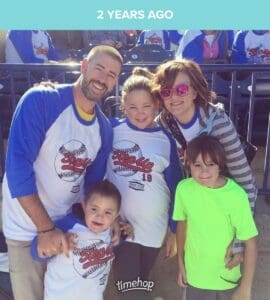 As a parent I still feel like I don’t quite fit at either party. I don’t totally fit in with the Down syndrome crowd and the same goes for the autism community. Owen doesn’t fit in either box either. I’ve decided that I may not be the only parent feeling this way. My goal is to be as transparent about our dual diagnosis life as possible, while still respecting our son’s autonomy. I also want to share our story to encourage any parent who is feeling what we were feeling that you are not alone. That statistics are showing that more and more people with Down syndrome also have autism. And if you suspect your loved one does, it’s always worth looking into.
As a parent I still feel like I don’t quite fit at either party. I don’t totally fit in with the Down syndrome crowd and the same goes for the autism community. Owen doesn’t fit in either box either. I’ve decided that I may not be the only parent feeling this way. My goal is to be as transparent about our dual diagnosis life as possible, while still respecting our son’s autonomy. I also want to share our story to encourage any parent who is feeling what we were feeling that you are not alone. That statistics are showing that more and more people with Down syndrome also have autism. And if you suspect your loved one does, it’s always worth looking into.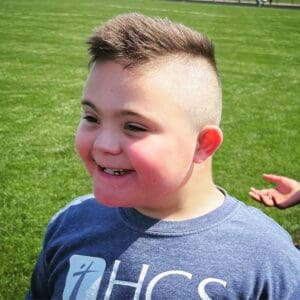 We still have difficult days, sometimes difficult seasons. We are all learning and growing and figuring out how to support Owen and one another as we move down this road. But we have hope again. The light is back in Owen’s eyes. He is a wonderful son, brother, and friend. He makes us laugh every day. He is blazing his own path and we could not be more proud of him.
We still have difficult days, sometimes difficult seasons. We are all learning and growing and figuring out how to support Owen and one another as we move down this road. But we have hope again. The light is back in Owen’s eyes. He is a wonderful son, brother, and friend. He makes us laugh every day. He is blazing his own path and we could not be more proud of him.



